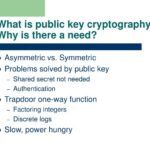The rapidly evolving landscape of technology presents both opportunities and challenges for the field of encryption. As we look toward the future of encryption over the next decade, several significant trends emerge that are poised to shape its development and application. From quantum computing to the rise of artificial intelligence, these trends will define how we safeguard sensitive information. But, can we truly stay ahead of these advancements, or are we merely chasing shadows in a complex game of cat and mouse?
One of the foremost trends in the encryption arena is the impending renaissance brought forth by quantum computing. Quantum machines operate on principles vastly different from classical computing, leveraging qubits instead of bits. While this may sound like the stuff of science fiction, the implications for encryption are profound. Current encryption methodologies, such as RSA and ECC (Elliptic Curve Cryptography), rely on the difficulty of certain mathematical problems. However, quantum computers have the potential to solve these problems exponentially faster than classical counterparts, thus rendering traditional encryption methods obsolete. The challenge lies in developing quantum-resistant algorithms before quantum technology becomes mainstream.
In tandem with quantum computing, the development of post-quantum cryptography is gaining momentum. Researchers and cryptographers are actively designing algorithms that can withstand the computational prowess of quantum machines. This emerging field aims to create robust encryption protocols that ensure data remains secure, even in a quantum-rich future. However, the transition to post-quantum cryptography poses its own set of hurdles: ensuring compatibility with legacy systems, minimizing performance overhead, and broadly educating stakeholders about these novel techniques become paramount tasks that must be addressed.
Another growing trend is the application of artificial intelligence (AI) in encryption methodologies. AI and machine learning are beginning to play crucial roles in encryption tasks, including key management and anomaly detection. By analyzing vast datasets, AI systems can identify patterns of potential vulnerabilities, enabling proactive defenses against emerging threats. However, this marriage of encryption and AI introduces a paradox: as AI enhances encryption, it also provides sophisticated tools for cybercriminals. How can we devise strategies that harness AI to protect our systems, while simultaneously safeguarding against its misuse?
The advent of decentralized systems and blockchain technology further complicates the encryption landscape. Traditionally, encryption has relied on centralized authorities to manage keys and facilitate secure communications. However, decentralized models empower users to manage their encryption keys directly, enabling greater autonomy and potential security. While this shift could democratize encryption, it also presents challenges in user error, as the responsibility of safeguarding keys now rests entirely on individuals. Ensuring users comprehend the importance of private key management will be crucial for the success of decentralized encryption systems.
Moreover, as the Internet of Things (IoT) continues its rapid expansion, the need for encryption extends to a staggering number of interconnected devices. IoT devices, from smart home appliances to industrial sensors, generate and transmit vast amounts of data, often without adequate protective measures. Securing these devices requires lightweight encryption that does not hinder performance while ensuring robust protection against unauthorized access. As the number of IoT devices grows, so too does the urgency for innovative encryption solutions that can effectively safeguard sensitive information across diverse endpoints.
Additionally, regulatory changes are influencing the trajectory of encryption in significant ways. Governments and regulatory bodies are increasingly scrutinizing encryption practices, often calling for backdoors or mandatory access for law enforcement. This poses a precarious dilemma—while facilitating investigations is important, weakening encryption can compromise security for millions. The ongoing debate about privacy versus security remains contentious, and its resolution will undoubtedly impact the future landscape of encryption.
As encryption technology progresses, the importance of fostering a culture of collaboration among cryptographers cannot be overstated. With emerging threats becoming more sophisticated, sharing knowledge, best practices, and methodologies across the community is essential for devising effective solutions. Collaborative efforts can also lead to the establishment of standards that govern the use of encryption, ensuring its integrity across various sectors.
Ultimately, as we gaze into the future of encryption, understanding user behavior must not be overlooked. The efficacy of any encryption method rests on its implementation and the users who must employ it. Educational initiatives aimed at informing users about best practices for maintaining security will be crucial. Ensuring users comprehend the intricacies of encryption—such as recognizing phishing attempts and the significance of multi-factor authentication—can drastically reduce vulnerabilities that exploit human error.
In conclusion, the decade ahead promises to be pivotal for encryption, shaped by quantum computing, AI advancements, decentralized systems, and evolving regulatory landscapes. The integration of these elements will inevitably pose complex questions and challenges to the field. The resilience of encryption will depend not only on technological innovations but also on the collaboration, education, and user engagement in implementing these protective measures. Are we prepared to meet the challenges that lie ahead, or will we find ourselves caught off guard by the next wave of advancements? The answers remain elusive but undoubtedly vital to our ongoing quest for security in an increasingly interconnected world.








Leave a Comment